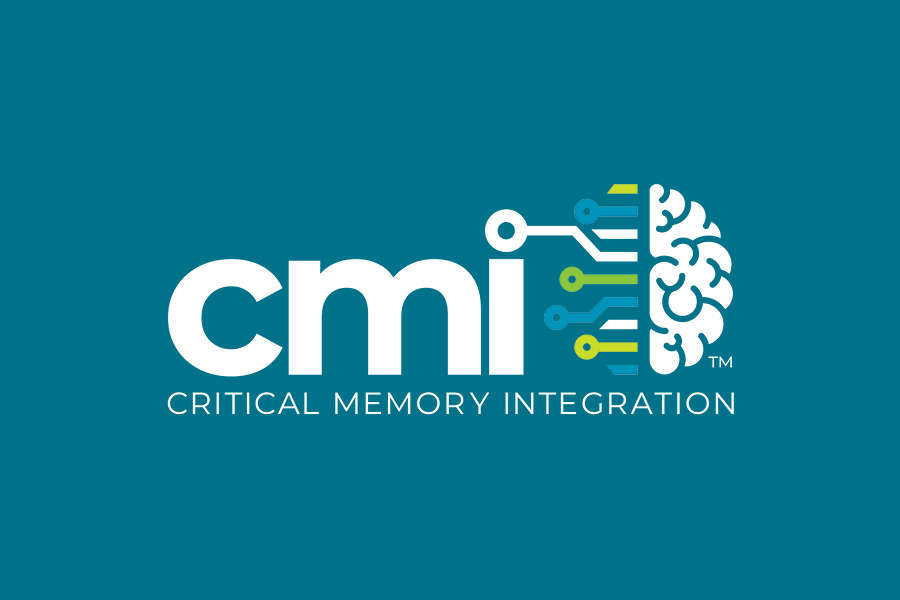
What is CMI™?
What is a Critical Memory?
Our perception of reality is shaped by past experiences that are stored in memory traces and networks beyond our conscious awareness. Critical Memories guide how a person interacts with the world for survival and social engagement, much like a policy and procedure manual. Although Critical Memories are not always traumatic, the patterns developed can influence a person’s perceptions, behaviors, and ability to integrate new experiences.
What does integration refer to?
Integration refers to the brain’s way of storing and updating information (consolidation and reconsolidation processes). The brain gathers information about an experience, including emotions and sensations, and integrates it into pre-existing knowledge. When the natural integration process is disrupted, the brain continues to operate with outdated information, leading to responses that no longer serve the individual and may cause distress. CMI™ aims to facilitate the Integration of these experiences to reflect what is important or valuable for the person now, ultimately reducing distress.
Why Develop CMI™?
Recent advances in psychotherapy provide effective treatments for alleviating trauma symptoms and self-regulation. However, managing long-standing adaptive behaviors with coping skills often requires significant effort and can be unsustainable, leading to feelings of failure. While coping can provide short-term relief, it may disrupt the long-term integration process. In order to identify underlying causes and address issues such as shame or a fragmented sense of self, we need to move beyond conventional approaches.
WHAT MAKES CMI™ DIFFERENT?
CMI™ helps people reclaim their sense of autonomy by integrating unresolved experiences and enhancing self-concept through learning and memory reconsolidation. In the safe presence of an attuned clinician, individuals explore discomfort with curiosity rather than merely alleviating it, leading to new perspectives, insights, and connections. As one client expressed, “I actually welcome flashbacks now.” While interventions such as bilateral stimulation can be incorporated, they are not required. CMI™ focuses on understanding and supporting the natural process of integration, rather than adhering to a specific protocol. This allows clinicians to adapt the approach to meet each person's unique needs and pace.
Is CMI™ Evidence-Based?
CMI™ is founded on common elements of existing evidence-based therapies and is supported by a robust body of applied neurological research on learning, memory, and emotion. Although still in the preliminary stages of research, initial effectiveness data for CMI™ looks promising. Clients who have participated in CMI™ sessions report reduced symptoms, increased overall well-being, and a stronger sense of self.

Taking CMI™ Nexus Training
Our multi-course training is designed for licensed mental health professionals.
CMI™ Training includes TWO COURSES: Foundations of CMI™ and Clinical Application of CMI™ .
Both courses must be completed to receive CEs.
FOUNDATIONS OF CMI™
Online Live Webinar Training
PART ONE of the CMI™ Nexus Training is an online, synchronous training focused on clinician development. This 2-day training prepares clinicians for the Clinical Application of CMI™. This training is a live, online class led by our clinical facilitators. This course contains a self-paced pre-work prerequisite.
CLINICAL APPLICATION OF CMI™
In-Person Training
PART TWO of the CMI™ Nexus Training is an in-person training focused on clinical skills. This 2-day, experiential training includes memory integration principles, the CMI™ protocol, clinical application, and in-person practicum. Upon completion of this training, clinicians will be eligible for 31.75 CEs.
Want to Learn More Before Registering?
Getting to the Core:
Critical Memory Integration
Our Free CMI™ Information Session covers the basics of Critical Memory Integration & available learning paths. Available as a one on one call or live webinar format, our Information Sessions provides you with valuable insight into the course.

